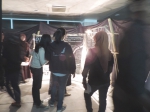What Can We Do About the Problem of Mounting Garbage in the Landfill
By Adi Permana
Editor Adi Permana

BANDUNG, itb.ac.id – The condition of Indonesia’s Landfill has begun to be alarming. Several cases, such as landfill fires in Antang Makassar and Suwung Bali, leachate from landfills that pollute rivers in West Bandung and Bantargebang, and the overload of waste in many landfills shows that landfills have polluted the environment a lot when not managed properly. This issue was discussed in the sixth webinar series organized by the Air and Waste Management Research Group (PUL) FTSL ITB on Thursday (10/6/2021)
“I think this waste issue is a very crucial issue in Indonesia, both in big cities (and) in small cities. This means that the garbage is a problem for all of us; not only the experts, but the contribution of the community's role is also very important in waste management,” said the Head of Air and Waste Management Research Group (PUL) FTSL ITB Prof. Ir. Puji Lestari, Ph.D. while opening the webinar.
The first speaker was Dr. Ir. I Made Wahyu Widyarsana M.T, discussing the rehabilitation and closure of the landfill. According to him, policy makers can evaluate the quality of the environment before making a decision, namely One way that can be done for landfill rehabilitation is landfill mining. This method not only rearranges the landfill, but also reuses the material in the stockpile, including extracting methane gas. Landfill mining technology is considered to increase landfill life, financial benefits, and landfill reclamation. However, the waste sorting process should remain a top priority in waste management so that the landfill does not bear too heavy a burden on waste problems.
It turns out that a lot of methane gas from landfills is still released into the atmosphere and causing the greenhouse effect. Therefore, Dr. Ir. Opy Kurniasari, M.T., conducted a study to reduce methane gas emissions by utilizing compost from waste that had been stored in landfills for a long period of time as landfill cover (biocover) which became a medium for methane oxidation. This oxidation process is influenced by the presence of oxygen in the biocover and the presence of nutrients that support the growth of microorganisms.
Completing the presentation, Ir. Prasetyo, M.Eng., as Director of Sanitation at the Directorate General of Human Settlements, Ministry of PUPR explained the government's efforts in waste management in Indonesia, including the revitalization of landfills. He emphasized to the Regency/City Government to operate the landfill infrastructure in their area in accordance with technical rules to reduce the problem of solid waste in Indonesia.
“In the future, we also have plans for cities/districts that have potential, in the sense that we initiate the construction of RDF (Refused Derived Fuel) facilities; how to process waste which will later turn into energy as a substitute for coal that can be used in the cement industry and in electric steam power plants,” he explained.
Reporter: Ristania Putri Wahyudi (Matematika, 2019)
Translator: Aghisna Syifa R (TPB SITHS 2020)

.jpg)
.jpg)
.jpg)
.jpg)
.jpg)



